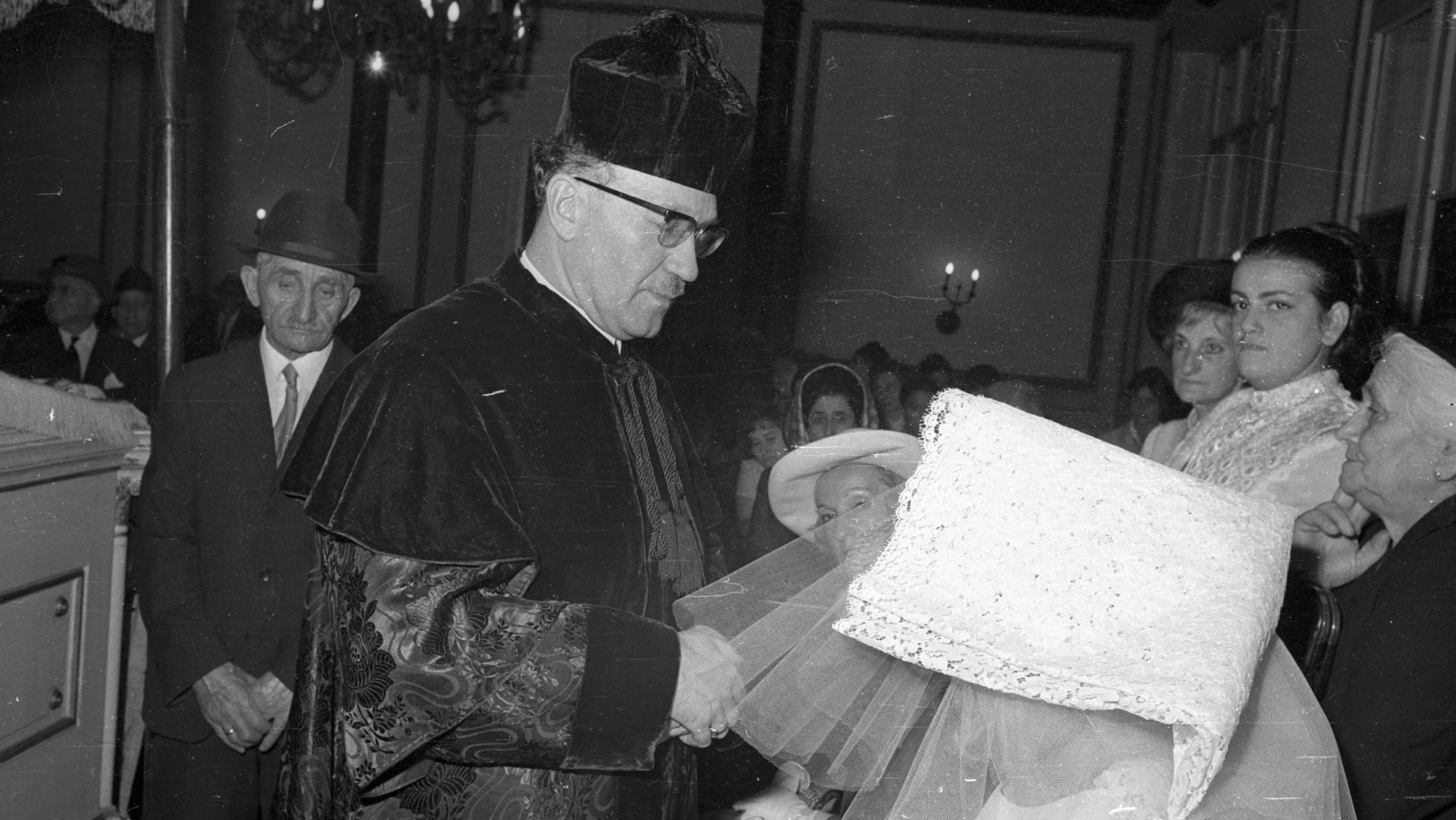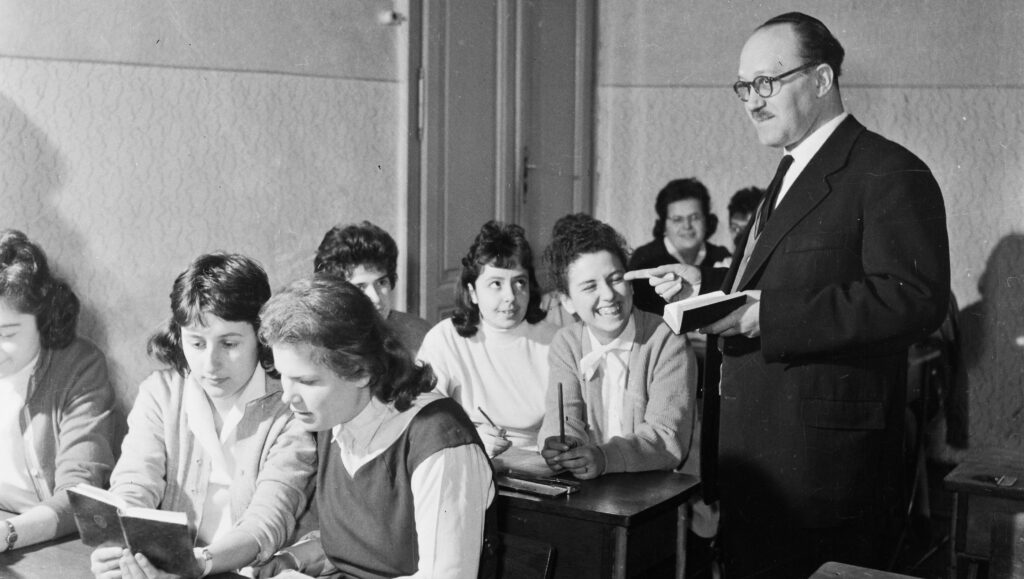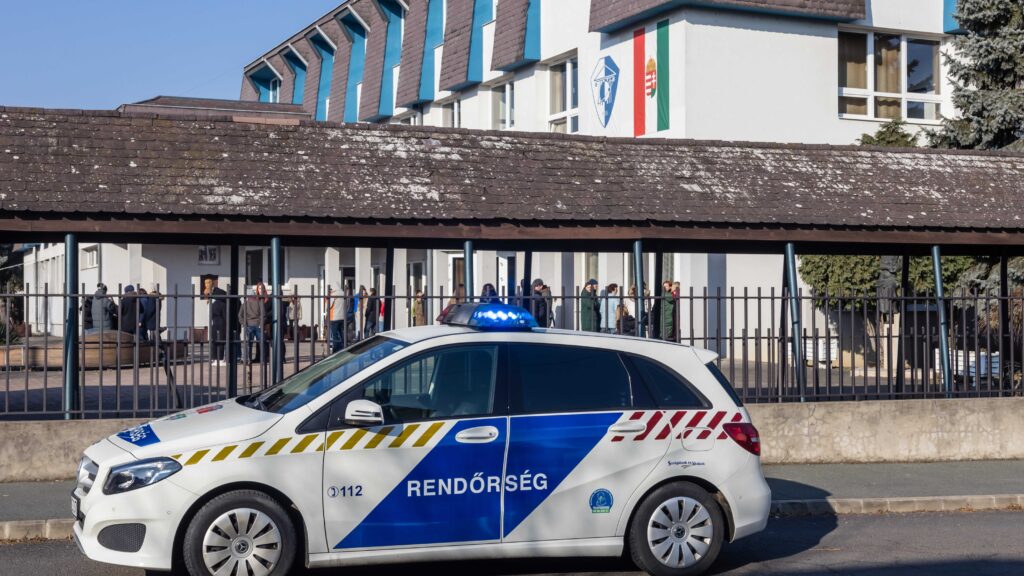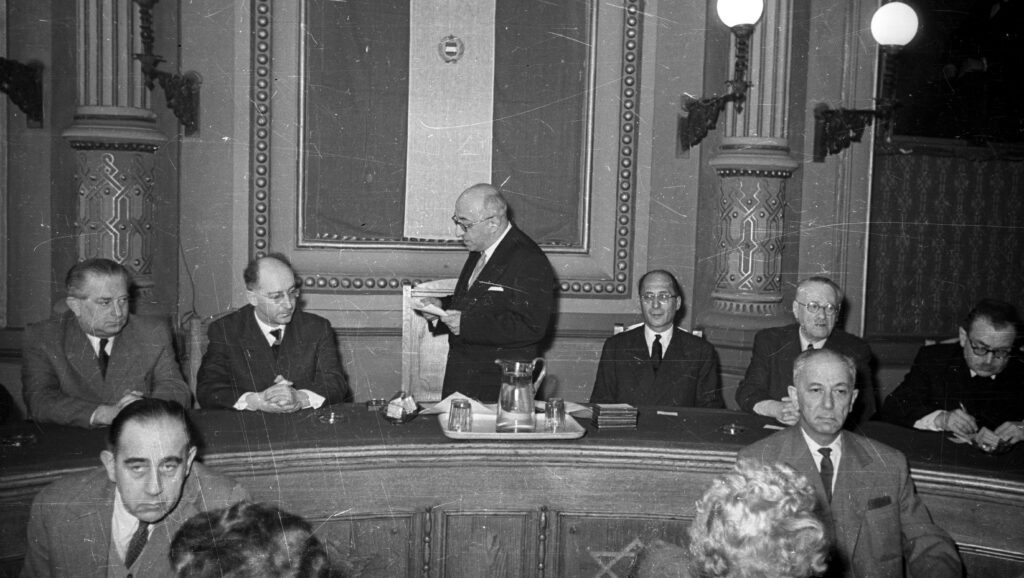As many history enthusiasts may know, Sándor Scheiber, the neológ rabbi and director of the Budapest Rabbinical Seminary, was repeatedly the target of covert investigations and anti-Zionist persecutions during the Kádár era. His persecution has been explored by several researchers, most comprehensively in András Kovács’s 2019 source book. However, even that work ignored the reports documenting Scheiber’s Kiddush ceremonies—his Sabbath welcoming services held in the synagogue of the Rabbinical Seminary—between 1975 and 1981.[1]
Although we know for certain that more than one agent monitored these famous events, only the reports of the informant codenamed ‘Viola’ (meaning Violet), an agent of the Ministry of Interior’s III/III-1-c subdepartment (responsible for counterintelligence against Protestant and other religious movements), have survived for the researchers to read. These reports are preserved in two ‘M’ (munka, ‘work’) dossiers, totalling 557 and 331 pages.
‘Viola’ appears in the surviving network records, allowing us to identify her as V S, a 40-year-old ‘technical draughtswoman’ employed by the Hungarian State Railways (MÁV). However, since her name is relatively uncommon and we do not wish to cast suspicion on elderly individuals who are most likely not her, we have chosen not to disclose her full name. Similarly, we have anonymized those mentioned in the reports who later did not become public figures. The first file of ‘Viola’ was opened on 31 October 1975, but as early as March of that year, she was already being used as a ‘candidate informant’ against Scheiber. Her reports from that period were likely transferred from her ‘recruitment dossier’, which has not survived.
There were agents who tried to submit reports as meaningless as possible to avoid harming anyone, while others fully embraced their role as secret informants. ‘Viola’ clearly belonged to the latter category—she seemed to take pleasure in reporting on her friends and acquaintances, eagerly detailing anything that might be of even the slightest interest to state security. She typically delivered her reports to her handler, Police First Lieutenant Pál Pénzes, at busy cafés. While her reports focused primarily on Scheiber’s Friday evening gatherings and the young Jewish group that regularly met at the Dunapark Café, her main target was, of course, Scheiber himself. At the same time, she also closely monitored several former or current rabbinical students, including cultural historian Róbert Dán, as well as the better-known Rabbis: István Berger (nicknamed ‘Csuló’), Tamás Lőwy, Sándor Polnauer, Tamás Raj, and István Zucker.
One of ‘Viola’s’ main tasks was to report on the Zionist convictions of the participants. In one of her very first reports, she wrote:
‘On 19 March, about 60 people attended the Seder night, celebrating Sándor Scheiber’s return from England with great ovation…V E walked around the room with a large package of Israeli propaganda material under his arm.’
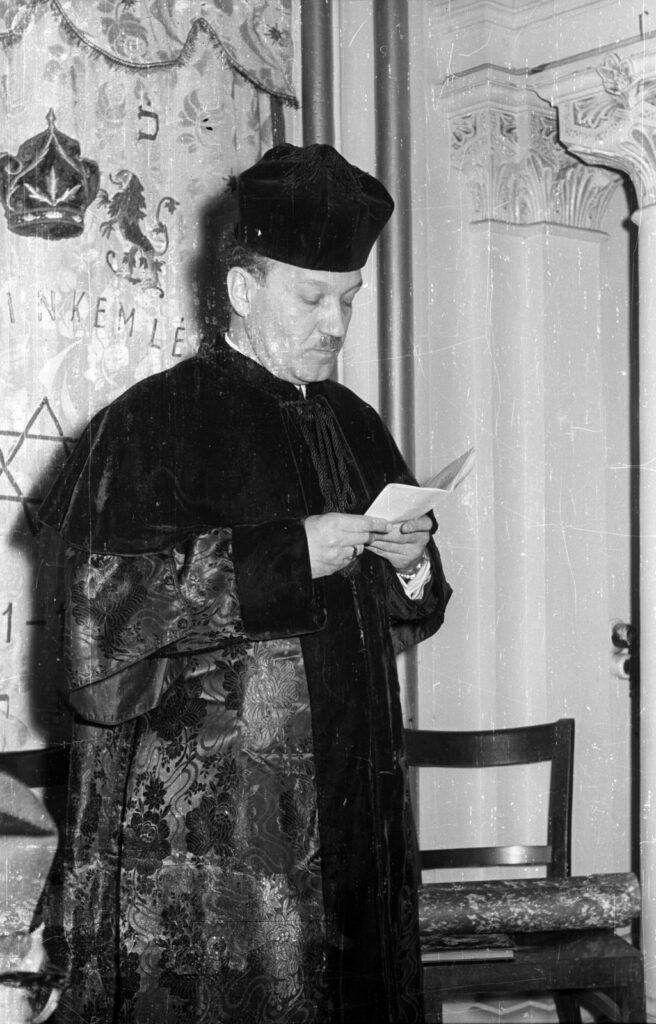
This comment reveals some ignorance of Jewish tradition (as Passover did not fall on that date in 1975), and ‘Viola’ frequently exposed her own lack of knowledge about Judaism. The evidence suggests that she was at least partially of Jewish descent, but she likely falsely claimed to be Jewish through her maternal lineage, as she regularly referred to her family history as her ‘little tale’ (cover story).
Her handler, First Lieutenant Pénzes, noted:
‘Our “network candidate’s” information is of a general atmospheric nature, but V E’s conspicuous behaviour is noteworthy from an operational perspective. The regular attendance of our candidate ‘Viola’ at the Seder nights expands our possibilities. I have asked the candidate to gather operationally useful information regarding V E.’
This reveals that merely appearing with Israeli newspapers was enough to attract the attention of state security—though, as we will see, sometimes even less was sufficient.[2]
During this period, a minor ‘scandal’ stirred the group: Péter Grósz, a rabbinical seminary student, had recently defected to Sweden. What made the situation even more sensitive was that Scheiber had vouched for him before the Ministry of Interior, assuring them that the young man had no intention of defecting. ‘I asked Tomi Lőwi [sic! Lőwy] about Péter, but he only said that the Director [Scheiber] is very nervous because he signed the passport application, and these students always end up staying abroad [ie, defecting]. He’s afraid they’ll question him. There’s no other news about Péter.’
Shortly afterward, ‘Viola’ reported: ‘I befriended Csuló.’ It was likely from him that she learned Grósz had written a letter to Berger, saying that things were going badly for him in Sweden and that he was living off American aid. ‘Csuló says they’re watching to see who works for the Ministry of Interior, but they don’t know yet.’ With this, he unknowingly warned his ‘friend’—who was in fact working for the Ministry of Interior—about the surveillance.
In the spring of 1976 ‘Viola’ was instructed to gather more information about Tamás Raj and Róbert Dán. At the time, Raj was classified as an ‘F’ (figyelt, or ‘monitored’) file subject—meaning he was considered so hostile to the regime that he was kept under constant surveillance without any specific reason. Dán, on the other hand, was one of the targets in a ‘group investigation’ against Scheiber and his associates. Dán, it seems, suspected ‘Viola’, at least according to one of her reports: ‘Robi Dán looked me in the eye all evening at the kiddush—I was almost uncomfortable. He had never even noticed me before…but now he was scrutinizing my thoughts so intently. I couldn’t return his gaze multiple times because it unsettled me. I need to be careful with this man.’ Pénzes, her handler, added a note to the report: ‘Róbert Dán regularly observes the behaviour of those attending the gatherings.’
It does not appear that ‘Viola’ was able to get closer to Dán, but she did provide a series of reports on Tamás Raj. Raj told her about his persecution roughly ten years earlier—this was part of Operation ‘Shalom’, a story we have already covered in the Hungarian Conservative.
‘I was in pretrial detention for three days; the Ministry of Interior arrested me,’ Raj recounted to ‘Viola’, who feigned disbelief while listening. Pénzes evaluated the report and assigned his agent a new task: ‘The agent provides information on the current situation of Tamás Raj, an “F” file subject, as well as his opinion regarding his exclusion from the religious organization.’ Task: ‘Obtain further information on Tamás Raj’s situation, his plans, and his political stance.’
Polnauer similarly became a focal point, as ‘Viola’ sniffed out—or at least believed—that he was involved in some special group or circle. This led to the first mention of his friend, I O. According to ‘Viola’s’ lengthy characterization, O ‘has Zionist sentiments and convictions.’ Regarding this assessment, Pénzes noted: ‘The agent prepared her report on I O’s connections at our instruction. The content of the report aids in understanding I O’s personality and activities.’ In May 1977 ‘Viola’—presumably following orders—visited O’s apartment. She did not leave merely with the conviction that ‘he is a great admirer of Sándor Scheiber’, but also stole his diary. ‘Our contact brought O’s diary to the meeting. According to our unverified information, I O is a member of a youth group that we have not yet identified,’ Pénzes remarked. From the diary, they extracted names and addresses.
After the Ministry of Interior concluded that Polnauer ‘played a leading role in illegal youth gatherings’ under the influence of the ‘bad spirit prevailing in the rabbinical seminary’, he was placed under 120 days of ‘K-surveillance’ (postal traffic monitoring). During this period, they made 47 photocopies of Polnauer’s correspondence, mainly with his sibling living abroad.[3] The goal was clearly to extract incriminating information about his Zionist activities, but the most they found was a mention that Polnauer had given a mezuzah to O. ‘Viola’ was ordered to gather more data: ‘Obtain further information on O I and Sándor Polnauer.’
The reports on István Zucker particularly shed light on the vile methods of the Kádár regime’s secret service. The agent was instructed to provide a profile of Zucker, who became the chief rabbi in Szeged in April 1977. ‘Scheiber’s admirer’ was the verdict on Zucker. The handler of ‘Viola’ instructed her to ‘obtain further information about the said individual through István Zucker’s fiancée.’ In her reports, ‘Viola’ repeatedly mentioned that she had a close friendship with Zucker’s fiancée, although this was likely an exaggeration to inflate her role and perceived intelligence-gathering opportunities. ‘Viola’ was also present at Zucker’s wedding in June 1977: she recorded that Scheiber praised the young rabbi, and there were cakes, cola, and pálinka. ‘Viola’ even requested photos from Zucker’s wife—presumably so the Ministry could study the attendees—which the lady promised to provide, though it seems this never happened.
One issue with the covert data collection was that it was not Scheiber, but rather the foreign guests who often made statements that could serve as evidence of Zionist activity. In February 1976, the former chief rabbi of Győr and, by then, Vienna, Akiba (Béla) Eisenberg was a guest at a kiddush. According to ‘Viola’, Eisenberg, ‘almost in a chauvinistic manner, presented the idea that we must never forget what it means to be a Jew.’ He expressed joy at seeing so many young people in the synagogue and praised that the youth had not forgotten their identity. Pénzes’s comment: ‘The agent’s report serves as operational evidence that Akiba Eisenberg, the Viennese rabbi, uses his frequent visits to Hungary to spread Zionist propaganda.’ Similarly, words that could be deemed ‘incriminating’ were spoken by József Löwinger, a Hungarian-born leader of the Greek Jewish Community (Central Jewish Council) in Athens: ‘[Back in Greece] every Friday, we sing Ha’tikvah. We are integrated into the nations, but for us, Israel is our homeland. Why don’t they sing Ha’tikvah here? Let the young people rise up! Don’t let them be silent!’
‘Viola’ didn’t always quote Scheiber or others from memory. At one point, she was evidently trusted enough to report: ‘I asked Sanyi [Scheiber] to allow me to record the service. He agreed. The recording didn’t work out’—presumably due to technical reasons. At other times, however, she succeeded: ‘I recorded Scheiber’s greeting on a tape.’ Later on, perhaps Scheiber became suspicious, as Rabbi Zucker was tasked with the responsibility of recording these speeches on tape. The collection of audio materials and photographs was part of a database being built by the Ministry of Interior.
‘Her conversation partners believed “Viola” was their friend. They welcomed her into their homes’
Unfortunately, it is not known exactly how long ‘Viola’ continued to report or how her reports were specifically used. Her second ‘M’ file was closed on 28 December 1981, with a note from Lieutenant Colonel Ferenc Bándi stating that since 1975, the agent had provided valuable operational information that was used in confidential investigations.
In her case, we are dealing with an agent who successfully infiltrated Scheiber’s kiddushim and, for years, supplied valuable information from the neológ Jewish community’s gathering place, a venue where young people believed they could freely express their Jewishness. (Although some, like Berger and Dán, were clearly aware that they were being watched by agents.)
Her conversation partners believed ‘Viola’ was their friend. They welcomed her into their homes, invited her to family events, and shared confidential secrets and gossip with her. It was not their fault that on the ‘other side’ the secret police of the antisemitic Kádár regime were listening, recording, and using everything against them.
[1] Kovács András, A Kádár-rendszer és a zsidók, Bp, Corvina, 2019.
[2] All quotes, unless indicated otherwise, are from ‘Viola’s’ file, found here: Állambiztonsági Szolgálatok Történeti Levéltára (ÁBSZTL), 3.1.2. M-39016, and M-39016/1.
[3] ÁBSZTL, 3.1.5. O-17169/5, 217–227.
Related articles:

